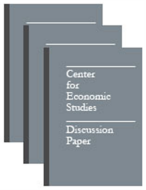
An official website of the United States government
Here’s how you know
Official websites use .gov
A .gov website belongs to an official government organization in the United States.
Secure .gov websites use HTTPS
A lock (
) or https:// means you’ve safely connected to the .gov website. Share sensitive information only on official, secure websites.
-
//
- Census.gov /
- Library /
- Census Working Papers /
- Relative Effectiveness of Energy Efficiency Programs versus Market Based Climate Policies in the Chemical Industry
Relative Effectiveness of Energy Efficiency Programs versus Market Based Climate Policies in the Chemical Industry
Relative Effectiveness of Energy Efficiency Programs versus Market Based Climate Policies in the Chemical Industry
Abstract
This paper addresses the relative effectiveness of market vs program based climate policies. We compute the carbon price resulting in an equivalent reduction in energy from programs that eliminate the efficiency gap. A reduced-form stochastic frontier energy demand analysis of plant level electricity and fuel data, from energy-intensive chemical sectors, jointly estimates the distribution of energy efficiency and underlying price elasticities. The analysis controls for plant level price endogeneity and heterogeneity to obtain a decomposition of efficiency into persistent (PE) and time-varying (TVE) components. Total inefficiency is relatively small and price elasticities are relatively high. If all plants performed at the 90th percentile of their efficiency distribution, the reduction in energy is between 4% and 13%. A modest carbon price of between $9.48/ton and $14.01/ton CO2 would achieve reductions in energy use equivalent to all manufacturing plants making improvements to close the efficiency gap.
Others in Series
Working Paper
Working Paper
Working Paper
Share
Related Information
Some content on this site is available in several different electronic formats. Some of the files may require a plug-in or additional software to view.
 Yes
Yes
 No
NoComments or suggestions?


Top

